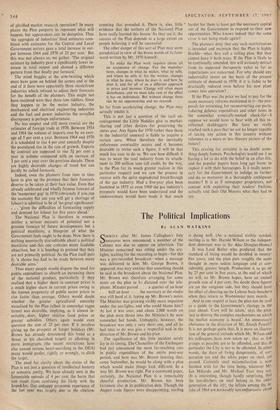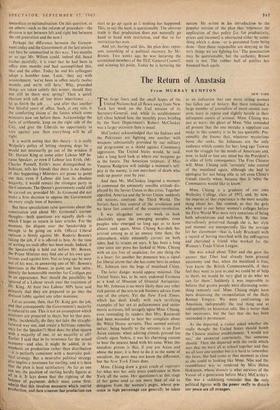The Political Implications
By ALAN WATKINS
SHORTLY after Mr. James Callaghan's July measures were announced, a member of the Cabinet was due to appear on television. The Minister concerned was sitting under the arc- lights, waiting for the recording to begin—for this was a pre-recorded broadcast—when a message was delivered to him. Mr. George Brown, it appeared, was very anxious that something should be said in the broadcast about the National Plan. Mr. Brown was therefore arranging for some notes on the plan to bz. dictated over the tele- phone. Minutes passed . . . a quarter of an hour
. . half an hour . . the secretary at the studio was still hard at it, typing up Mr. Brown's notes. The Minister was growing visibly more impatient under the arc-lights, and who could blame him? At last it was over, and about 2,000 words on the plan were thrust into the Minister's by now somewhat •hot hands. Unhappily, however, the broadcast was only a very short one, and all he had time to do was give a respectful nod in the direction of Mr. Brown and his plan.
The significance of this little incident surely lay in its timing. The Chancellor of the Exchequer had just announced the most far-reaching cuts in public expenditure of the entire post-war period, and here was Mr. Brown insisting that, come September, he would be along with a plan which would make things look different. In a way Mr. Brown was right. For a command paper, certainly, the National Plan is, a remarkably cheerful production. Mr. Brown has been fortunate also in its publication date. Though the August trade figures were disappointing, sterling is doing well. (As a national virility. symbol, sterling is to Mr. Harold Wilson as the indepen- dent deterrent was to Sir Alec Douglas-Home.)
It was Lord Butler who predicted that the standard of living would be doubled in twenty- five years, and the plan puts roughly the same thought in more sedate language and at con- siderably greater length. Production is to go up by 25 per cent in five years, at the end of which we will, so Mr. Brown hopes, have an annual growth rate of 4 per cent. No doubt these figures are on the sanguine side, but they should have the effect of cheering up the Labour back-benchers when they -return to Westminster next month.
And in one respect at least the plan Can be read as a guide to the Government's strategy in the year ahead. 'Care will be taken,' says the plan. 'not to destroy the complex mechanisms on which the market economy is based.' An unnecessary obeisance in the direction of Mr. Enoch Powell? It is not perhaps quite that. It is more an illustra- tion of the general attitude which Mr. Wilson and his colleagues.have now taken up: that as few groups as possible are to be offended, and that in particular the. City is not to be offended. In other words, the days of living dangerously, of cor- poration tax and the white paper on steel, are passed. Certainly steel nationalisation is now finished with for the time being, whatever Mr. Ian Mikardo and Mr. Michael Foot may say. (It is interesting, though hardly surprising, that the last-ditchers. on steel belong to the older generation of the left; the leftists among the hi- take of 1964 are noticeably less enthusiastic about immediate re-nationalisation. On this question, as on others—such as the reform of procedure—the division is not between left and right but between the old generation and the new.)
Perhaps the difference between the Govern- ment today and the Government of the last, session can best be summarised in this way. Two months or so ago Mr. Wilson could, indeed did, boast (rather painfully, it is true) that he had been in office nine months and had accomplished this, that and the other. Today he and his colleagues adopt a humbler tone. 'Look,' they say with astonishment, 'we've been in office nearly twelve months and we're still here.' Why, provided things are taken calmly this winter, should they not still be there next spring? Then a quick election with talk of 'our bitter inheritance . . . let us finish the job . . .' and after that another five blissful years of office. Such. at any rate, is the comforting vision of the future which some ministers now see before them. Acknowledge the facts of arithmetic, keep on the right side of the City, and give the Liberals no opportunity to vote 'against you: then everything will be all right.
It is worth noting that this theory,--it is really Walpole's policy of letting sleeping dogs lie— would not necessarily go out of the window if Dr. Horace King or some other Labour MP be- came Speaker, or even if Labour lost Erith. (Mr. Charles Pannell, Erith's most distinguished in- habitant, tells his friends that there is no chance of this happening.) Ministers are prone to point out that, even if Labour did lose its absolute majority, it would remain the strongest party in the Commons. The Queen's government could still be carried on, provided Mr. Jo Grimond did not make a firm decision to oppose the Government on every single item of business. . . .
But these speculations raise questions about the constitution and about Mr. Grimond's current thoughts--both questions are equally dark—to Which I hope to return in later articles. For the moment, the dispute over the Speakership is enough to be going on with. Official Liberal opinion is firmly against Mr. Roderic Bowen's taking the job, if it is offered to him. At the time of writing no such offer has been made. Indeed, if the Speakership is held out before Mr. Bowen, the Prime Minister may find one of his own quo- tations used against him. Not so long ago he went out of his way, in answering one of Mr. Bowen's questions in the House, to point out how infre-, quently the honourable member for Cardigan put in an appearance. Nor should the possibility be ignored of a Labour revolt over the treatment of Dr. King. At least two Labour MPs have said Privately that they are prepared to go into the division lobby against any other nominee.
Let us assume, then, that Dr. King gets the job, and that consequently the Government's majority is reduced to one. This is not an assumption which ministers are prepared to share, but let that pass. (Why, incidentally, do they not take the straight- forward way out, and create a fictitious constitu- ency for the Speaker?) How does the plan square with a majority of one, or no majority at all? Earlier I said that in its reverence for the mixed' economy—and also, it might be added, in its emphasis on production rather than distribution —it is perfectly consistent with a neutralist poli- tical strategy. But a neutralist political strategy also implies a reverence for sterling; and it is here that the plan is least satisfactory. As far as one can see, the position of sterling hardly figures at , in it. It lays down that the righting of the balance of payments deficit must come first; admits that this involves measures which restrict Production; and then assumes that production can
start to go up again as is nothing has happened. This, to say the least, is questionable. The obvious truth is that production does not naturally go hand in hand with restriction, and that so far restriction has won.
And yet, having said this, the plan does repre- sent something of a political recovery by Mr. Brown. Two weeks ago he was lecturing the astonished members of the TUC General Council, and winning his point. Today he is lecturing the nation. He writes in his introduction to the popular version of the plan that 'whenever the application of that policy [i.e. for productivity, prices and incomes] is obstructed either by some- thing which is done—or is prevented from being done----then those responsible are denying us the very things we are fighting for.' The punctuation may be questionable, but the authentic Brown note is not. The rubber ball of politics has bounced back again.































 Previous page
Previous page